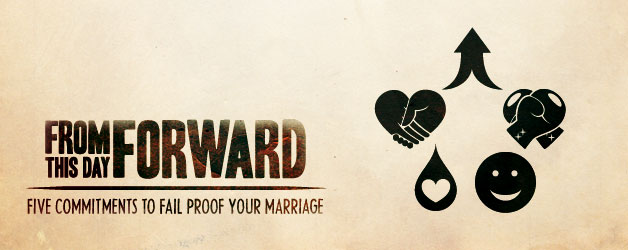
From this Day Forward – Have Fun*
Sycamore Creek Church
June 14/15, 2015
Tom Arthur
Peace friends! Today we’re going to have some fun in this message. That means it’s rated PG. So parents, be guided. We’re in this series called From this Day Forward. We’re looking at building a thriving marriage by making five commitments:
- Seek God
- Stay Pure
- Have Fun
- Fight Fair
- Never Give Up
I want to give a plug for next week. Fighting fair is probably one of the most important things we can learn to do well to help our marriage thrive. So don’t miss next week. But before we get to the fighting, we’re going to have some fun. What’s the best advice on marriage you’ve ever been given? I’m not sure it’s the best advice, but here’s some advice from famous people and celebrities:
Will Ferrell: “Before you marry a person, you should first make them use a computer with slow internet to see who they really are.”
LeAnn Rimes: “A good friend just told me that the key to a successful marriage was to argue naked!”
Phyllis Diller: “Never go to bed mad. Stay up and fight.”
What’s the best piece of marriage advice you’ve ever heard? We asked people around our church what’s the best advice they were given about marriage. Here’s what they said:
The best advice I was ever given was by my dad, who has been married three times. I think he knows something about what doesn’t work. He told me: “You either grow together or you grow apart.” In other words, there’s no coasting in marriage. You can’t just set your marriage off on a shelf to the side and hope it will stay thriving. I was reminded of this the last time I was at my dad’s house. I saw my trick bike from High School hanging in the garage. I had so much fun on this bike growing up. I took it everywhere. It gave me hours and hours of fun.
My son has just learned to ride a bike and I thought it would be fun to bring my old bike home and ride it with Micah. It was fun back then. Surely it will be fun right now. The next time we went to the skate park, I put it on the bike rack and took it with us. When I hopped on it and began riding, I realized the truth that my dad had taught me. The tires were so brittle from 20 years of disuse that they almost immediately shredded and disintegrated. They literally fell apart. (Not to mention that I’m no spry teenager hopping around on a trick bike anymore.) You can’t ignore something for twenty years and imagine that you can just pick it back up and it will be just as fun as it was. You either grow together, or you grow apart. You either take the time to keep at something, or it falls apart. You either work at it, or you lose it. There’s no coasting when it comes to keeping up a bike, and there’s no coasting when it comes to marriage. One of the key ways you pay attention to your marriage so it doesn’t fall apart is have some fun together.
The author of Ecclesiastes took a long and hard look at life and all that this world has to offer and wrote down what he saw. Here’s one of his observations:
Relish life with the spouse you love
Each and every day of your precarious life.
~Ecclesiastes 9:9 (The Message)
Without some fun, adventure, romance, and physical intimacy, marriage is reduced to a business partnership. What bills do we need to pay? Who is picking up the kids after school? What do we need to do in the yard this weekend? People don’t fall in love having a bad time: “I went out with this guy and we had nothing in common and did nothing and it was such a turn on!”
When Sarah and I first got married we had a lot of fun keeping up dating one another. We would each plan one surprise date a month. We were super creative about these dates. One time I took Sarah on a scavenger hunt around town. We would sit down on a bench and taped underneath it was a love note. We’d walk by a tree and clipped to a branch was another love note. She had an awesome time walking around finding all these love notes hidden. Then there was the time she created an “Eco Challenge” for me. The Eco Challenge was this adventure race on TV. She made a miniature version of it that included hiking, biking, swimming, and ended at the beach with a little boat she had just bought me. Wow! But here’s my favorite one I ever planned (or at least the favorite one I’m willing to talk about publicly). I took her to a sushi place. We have this little “tradition” of putting “in bed” on the end of the fortune cookies we get. So to surprise her, I talked to the manager earlier in the day and gave him some custom fortune cookies I had made all ending with “in bed.” When we were done with dinner, he delivered the fortune cookies to the table. I’ll never forget Sarah’s surprise at opening one fortune after another of what life was going to look like in bed.
Let me provide one note of caution before we dive further into this idea of having fun in marriage. The kind of fun we have in marriage changes over time. Usually as a culture we idolize the puppy love and infatuation that romance begins with. We spend a lot of time and energy trying to reclaim or rebuild that same puppy love even though we’ve been married for twenty years. C.S. Lewis has this wisdom to share with us:
“It is simply no good trying to keep any thrill: that is the very worst thing you can do. Let the thrill go—let it die away—go on through that period of death into the quieter interest and happiness that follow—and you will find you are living in a world of new thrills all the time. But if you decide to make thrills your regular diet and try to prolong them artificially, they will all get weaker and weaker, and fewer and fewer, and you will be a bored, disillusioned old man for the rest of your life. It is because so few people understand this that you find many middle-aged men and women maundering about their lost youth, at the very age when new horizons ought to be appearing and new doors opening all round them. It is much better fun to learn to swim than to go on endlessly (and hopelessly) trying to get back the feeling you had when you first went paddling as a small boy.”
~C.S. Lewis (Mere Christianity)
So be ready for the kind of fun you have in a relationship to change over time. But remember fun is not a luxury in marriage. You don’t have time not to have fun. If you don’t have time to have fun in marriage, then one day you may not have a marriage. So I want to share with you three ways every couple needs to have fun.
1. Face to Face Fun
When you’re dating you talk and talk for hours on end. Run out of things to say and just listen to each other breathe. (Not that kind of breathing!) But when you get married there’s a temptation for the face to face time to become business time. How are the finances doing? How is school going for the kids? Did you get the oil changed in the car?
The Song of Solomon is probably the steamiest book in the Bible. It’s a love song between two people madly in love. Sometimes the woman sings to the man and other times the man sings to the woman like here:
How beautiful are your sandaled feet,
O queenly maiden.
Your rounded thighs are like jewels,
the work of a skilled craftsman.
Your navel is perfectly formed
like a goblet filled with mixed wine.
Between your thighs lies a mound of wheat
bordered with lilies.
Your breasts are like two fawns,
twin fawns of a gazelle.
~Song of Solomon 7:1-3 NLT
Did you notice anything about how the man sings to the woman besides the fact that he talked about her breasts? I know, a lot of you got stuck right there. But here’s what I’m driving at: he talks about details. Some of us like headlines but others like details. This reminds me of an article I once read about writing a really good thank you note. There were four parts:
- Be specific – “Thank you for the extra time you put into…on Friday.”
- State the cost – “You could have been relaxing, biking, etc.”
- Personal affect – “It made me feel great and helped me do what I needed to do.”
- Thank – “Thank you so much for…”
Be specific. Give details. Find the face to face time to have fun.
Sarah and I began having a weekly date night when we moved into the Isaiah House while we attended seminary. The Isaiah House was a Christian intentional living community. We lived with other Christians and offered a couple of rooms to woman and children in transition. Every night we ate dinner together with twelve or so other people. We realized after the first two weeks that we had barely talked to one another because we were no longer talking to one another at dinner. We were talking to the other twelve people around the table. We needed a time apart for just the two of us to talk about the details of what was going on in our lives. Enter date night.
Do you have a time when you have face to face time with your spouse? Let me be clear here. Face to face time is NOT driving your kids to an activity. It’s NOT talking while watching a show. It’s NOT talking while messing with your cell phone. Face to face time is focused time with your spouse.
Sarah and I have found after eighteen years of marriage that we need a little help moving from business conversations to personal conversations. So we often use a conversation starter book. Before we head out on a date, I look through a little book and rip out one of the pages to help us start conversations. Sometimes our conversation flows just fine. Other times we find the questions on the page helpful for having some fun conversation. Last Friday, here’s the question we talked about: “If you could wear a magical pair of glasses that allowed you to read your partner’s MIND for 60 seconds in a 24-hour day, when would you want to wear them most?” Wow! That was an interesting conversation.
When do you have face to face time with your spouse? (By the way, if you’re not married, we all need face to face time with our friends too!)
2. Side to side Fun – Men generally crave
You might say that generally speaking, women crave face to face time while men crave this second kind of fun: side to side fun. Side to side fun is enjoying time doing common activities. Back to the Song of Solomon:
Come, my love, let us go out to the fields
and spend the night among the wildflowers
~Song of Solomon 7:11
In other words: Weekend getaway! Campout! Cabin! This kind of fun has changed over time as Sarah and I have grown. Before we had kids we liked to ski together, downhill and cross country. We liked to bike together. We would hike and camp together. We’ve spent five nights on the trail together backpacking. Now that we’ve got kids our side to side time is a little less exotic but still important and fun. We go on walks together. We go to a bookstore and pick out books to show one another. Last time we did this Sarah suggested we each pick a book of somewhere we’d like to travel together some day and spend time looking through it together. We go see plays (we particularly enjoy plays at Peppermint Creek Theater). Sometimes we go shopping together. Neither of us is big shoppers, but Sarah likes shopping with me. She says I pick out better clothes for her than she picks out herself. Here’s my secret: I just pick out clothes I like. She likes that I like them and somehow they always seem to fit better and feel more comfortable. This was not a skill I knew I had before I got married. But we have fun doing it together.
Do you know what your spouse enjoys doing? Does he enjoy golfing, hunting, classic cars, NASCAR? Have you ever tried to do these things with him? Does she enjoy Downton Abbey? Shopping? Running? Have you ever tried doing these things with her? And I mean really trying to do them? To enjoy them? Maybe they’re not your favorite thing to do, but you’ll be building bridges with your spouse when he or she sees you making the attempt.
Here’s a little tip, women. I mentioned that men tend to crave side to side fun more while you crave face to face fun. You’re more likely to get face to face time if you include it with some side to side time. Your man is more likely to open up when he’s doing something he enjoys, or right after he’s done something with you he enjoys (if he doesn’t fall asleep first!). Which brings us to the last kind of fun every couple needs.
3. Belly Button to Belly Button
I know you think the Bible is just boring literature with nothing sexy in it. But I’m about to blow your mind here. Back to the Song of Solomon. The woman sings to the man:
Let us get up early and go to the vineyards
to see if the grapevines have budded,
if the blossoms have opened,
and if the pomegranates have bloomed.
There I will give you my love.
~Song of Solomon 7:12 NLT
“There I will give you my love.” What’s she talking about? She’s saying, “Let’s go have sex in a park!” Whoever said that men were the only ones with crazy sex ideas just didn’t know women very well. Now I’m not telling you to go have sex in a park, unless…well, no. But I am telling you that every marriage needs some good belly button to belly button fun.
My dad gave me another piece of advice when it comes to sex that has turned out to be just plain wrong. He said that if you put a quarter in a jar every time you have sex the first two years of marriage and then take one quarter out every time you have sex after the second year, you’ll never run out of quarters. That’s just not right. Every piece of research I’ve read says that married people have more sex than unmarried people. Here’s my own tip for you: calendar sex. I know it doesn’t sound very romantic. And I’m not saying you can’t have sex if it’s not on the calendar, but if you know sex is coming on Thursday night, then everyone will be ready for it. The anticipation will build. Who knows, the anticipating may be too much to wait for Thursday night!
My dad’s not the only dad who gave his son advice about marriage. The book of Proverbs, an ancient wisdom book, records the advice a dad gave to his son about marriage. Although it could as well be the advice given to a daughter by a mother:
Let your wife be a fountain of blessing for you.
Rejoice in the wife of your youth.
She is a loving deer, a graceful doe.
Let her breasts satisfy you always.
May you always be captivated by her love.
~Proverbs 5:18-19
“This is the word of God for the people of God. May God add blessing to the reading of his word!” In other words, enjoy sex. Enjoy the body of your spouse! Enjoy sex. Let it be intoxicating. The word “captivated” is Shega in the original Hebrew. Shega almost always is translated as “led astray” by strong drink. Or the dad could say, “May you always be intoxicated by her love.”
Let’s talk a bit about sex here. Yes, we’re going to talk about sex in church. Yes, that’s because the Bible talks about sex in church. Well, not sex in the church building, but giving the church counsel on sex. Here’s two tips. One of you, generally speaking the man, needs to work on your approach. What worked when you first got married and were young lustful bunnies, probably isn’t working for you anymore. I know that men can turn anything into a sexual innuendo.
Wife: “Honey, will you get me some cereal.”
Husband: “Yeah, I’ll get you some cereal.”
Wife: “Honey, will you get the oil changed in the car today?”
Husband: “You know I’ll change your oil, baby.”
Well, actually, in my house, we find this pretty funny. But if that’s all you’re doing, men, then you’ve got to improve your approach. Think of the whole day as foreplay. Actually, think of the whole marriage as foreplay. You can’t go from zero to sixty in the time it takes you to roll over onto her side of the bed.
So if men need to work on their approach, then generally speaking, women need to work on making an approach. “But we’ve got kids, and I’m always exhausted because of them.” Well, put the kids in front of the TV, pop in the Dora the Explorer DVD, run to the room, lock the door (very important!) and say: “We’ve got 30 minutes. Go Diego! Go!”
I know I’m speaking in a lot of stereotypes today. The stereotypes aren’t meant to suggest that this is the way things are supposed to be, but rather to suggest that this is the way things generally are. Generally speaking most men desire physical intimacy more often than women, and women desire more face to face fun or emotional bonding than men. Here’s the hitch. Women have legitimate and holy opportunities for emotional bonding outside of their husbands. But a husband has no other legitimate sexual outlet other than his wife. Wives, when you turn off the physical intimacy faucet in your marriage, it’s the equivalent of an emotional crisis for yourself. Men, when you turn off the emotional intimacy faucet in a marriage, it’s the equivalent of a sexual crisis for yourself.
But I don’t feel close to my spouse. Remember, feelings follow actions. You had fun once. Learn to have fun again. If the grass is looking greener somewhere else, then it’s time to water your own yard. Take off the old brittle tires from the relationship bike, and put on some new ones. Stop ignoring the fun in your marriage. From this day forward…
God the Eternal keep you in love with each other,
so that the peace of Christ may abide in your home.
Bear witness to the love of God in this world
so that those to whom love is a stranger
will find in you generous friends.
The grace of the Lord Jesus Christ,
and the love of God,
and the fellowship of the Holy Spirit
be with you all. Amen.
*This sermon is based on a sermon first preached by Craig Groeschel.







Recent Comments